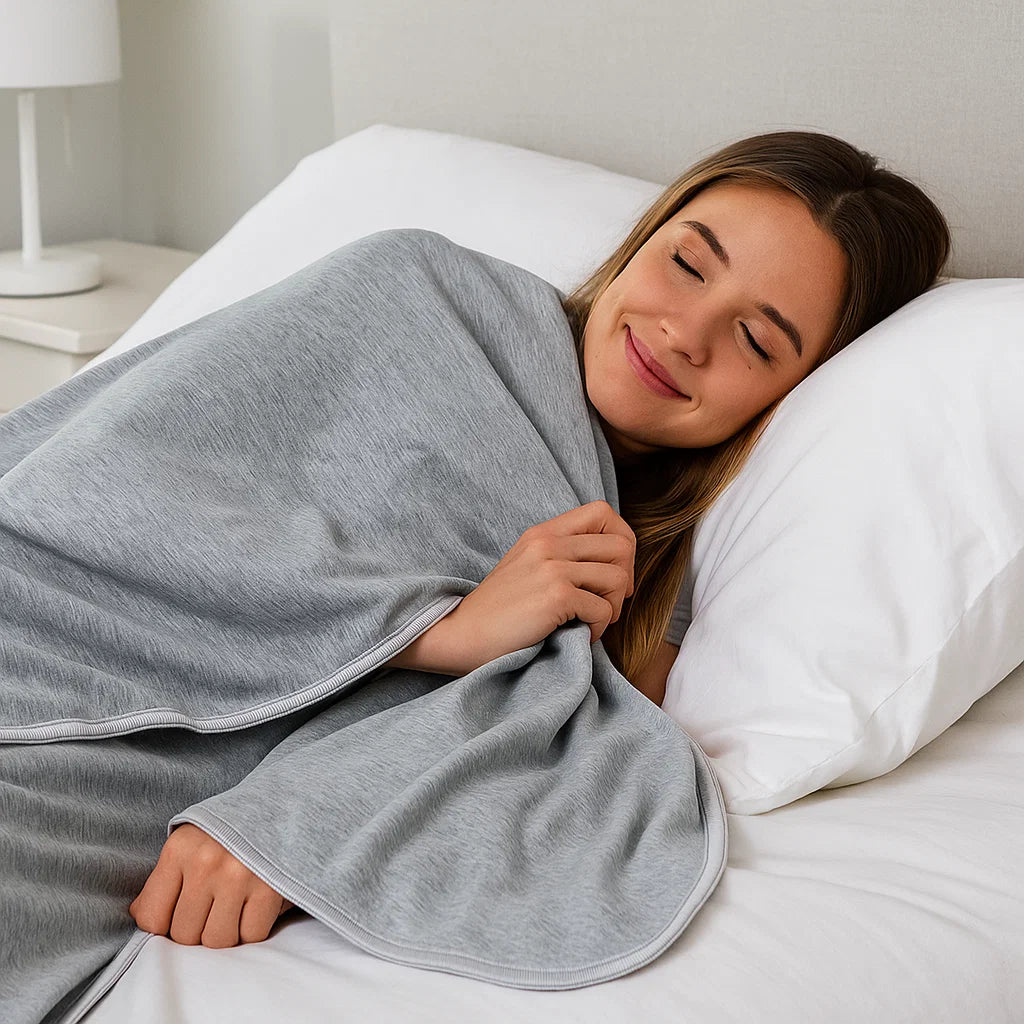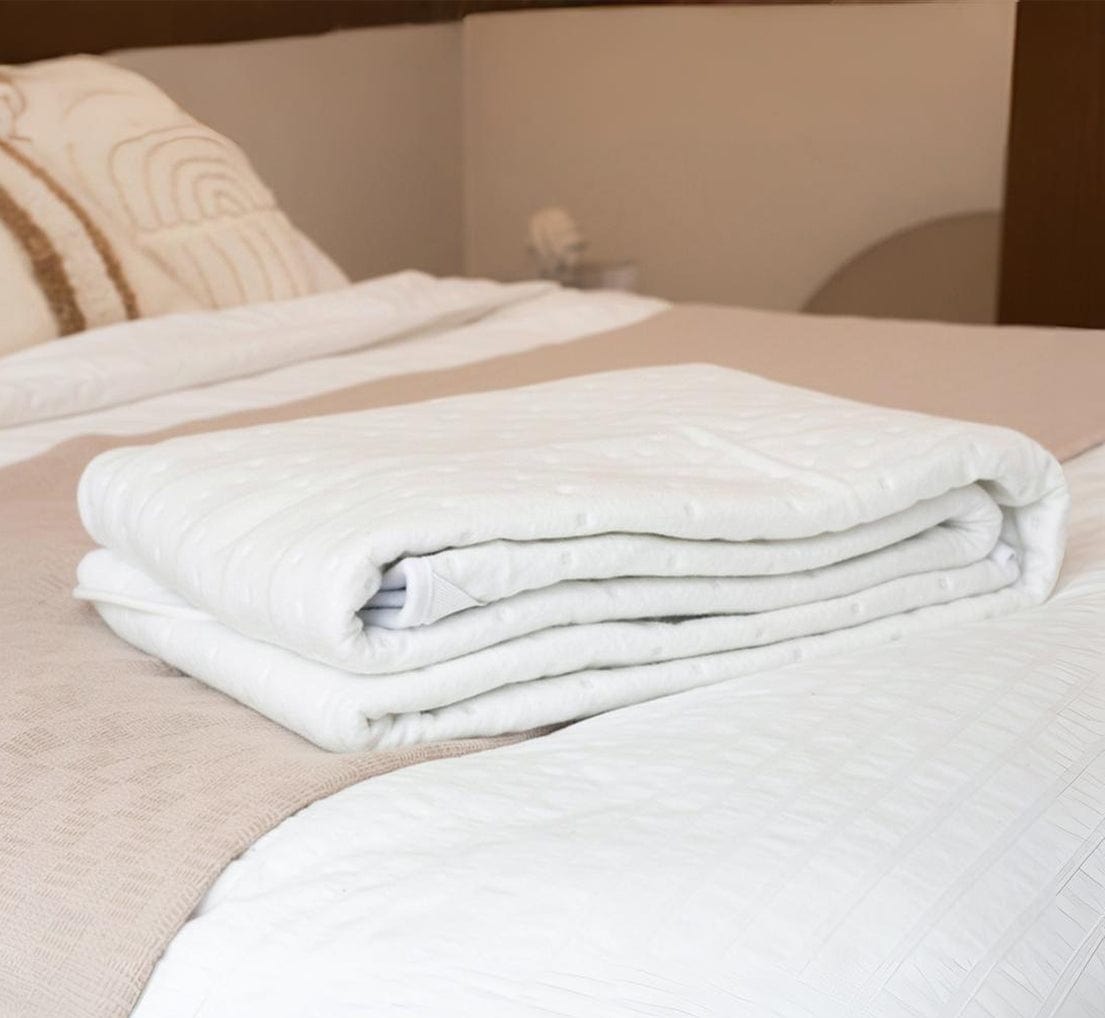Hot summer nights can seriously disrupt your sleep. Many people sleep lightly, toss and turn restlessly, or wake up drenched in sweat. The first resort is often a fan or even an air conditioner to lower the temperature. However, both options have their drawbacks: a fan doesn't actually cool the air and can be noisy, while an air conditioner consumes energy and dries out the air. Fortunately, there's an often-overlooked alternative: the cooling blanket. Also known as a cooling blanket or cool duvet, this simple sleep accessory can make a surprising difference on hot summer nights. In this article, we'll compare the cooling blanket with an air conditioner and fan and determine which solution is the most effective and comfortable.
The challenge of sleeping in the summer
When the outside temperature remains high in the evening, your body struggles to cool down. During sleep, your body temperature should drop slightly, allowing you to enter deep sleep. If your bedroom remains too warm, you often only get shallow sleep and wake up multiple times. Many people therefore turn on a fan or air conditioner, but that's not always a sustainable or pleasant solution. It's precisely in this search for cooling that the cooling blanket in picture.
What exactly is a cooling blanket?
A cooling blanket or cooling blanket is specially designed to better dissipate heat and regulate moisture. While a regular duvet retains heat, a cooling version ensures that excess heat dissipates more quickly. This is achieved through the use of breathable fabrics and fibers that don't trap moisture, but rather distribute and evaporate it. The result is a bed that feels less warm and in which you stay refreshed for longer. Various styles are available: from a large cooling duvet for double beds to a separate cooling duvet cover that you can easily combine with your existing duvet. The terms "cooling duvet" or "cool duvets" are also often used, but they all refer to the same principle: sleeping in a cooler microclimate without being dependent on appliances.
Fan: air circulation but no real cooling
A fan is one of the most commonly used heat-relief devices in the bedroom. It's inexpensive, quick to install, and provides an immediate, pleasant breeze. However, its effectiveness is limited because a fan doesn't lower the room temperature. It simply displaces warm air, making it feel temporarily more comfortable, but the heat problem persists. Furthermore, many people find the constant humming annoying, especially at night in a quiet bedroom. Moreover, prolonged use of a fan can cause dry eyes or stiff muscles due to the direct airflow. While it offers a temporary solution for mild cooling, it's certainly not a miracle cure.
Air conditioning: powerful but expensive and impractical
At first glance, an air conditioner seems like the most effective solution. It can actually lower the temperature in a room, and you'll notice it almost immediately. However, there are drawbacks to using an air conditioner in the bedroom. The unit consumes a lot of energy, causing electricity costs to quickly rise, especially if it's running for several hours a night. Furthermore, an air conditioner always makes noise, no matter how quiet the model is advertised. This is disruptive to many people while they sleep. An air conditioner also often blows dry air, which can lead to irritated airways, dry eyes, or a sore throat. Installing an air conditioner is also an investment and not permitted or practical in every home.
Cooling blanket: comfort without noise
A cooling blanket distinguishes itself by offering comfort without noise, energy consumption, or complicated installation. Simply place the cooling duvet or duvet cover over your bed to notice an immediate difference. The material absorbs and releases heat, helping your body maintain a comfortable temperature. Because it also regulates moisture, it's particularly suitable for people who suffer from night sweats. The experience is also more natural: instead of artificial cold air, you sleep under a fabric that supports your body's natural regulation. The effect varies from person to person—some notice a significant difference immediately, while others experience it more subtly—but almost everyone feels that a cooling blanket creates a more peaceful sleep environment.
What works best right now?
When you compare the three solutions, the differences are clear. A fan offers quick but superficial relief and doesn't really solve the heat problem. An air conditioner is powerful but energy-intensive and can disrupt your sleep due to noise and dry air. A cooling blanket offers a simple, quiet, and sustainable alternative. For those looking for a practical way to get through the summer without breaking the bank, a cooling duvet often proves to be the most comfortable choice.
Who is a cooling blanket ideal for?
The benefits of a cooling blanket are broad. People who suffer from night sweats experience immediate relief because moisture is better wicked away. Menopausal women who struggle with hot flashes often find it a natural solution. Athletes who stay warm in bed for a long time after an intense workout feel their bodies relax more quickly. And for anyone who prefers to avoid high energy bills but still wants to sleep cool, a cooling blanket or duvet cover is a smart choice. Thanks to the different sizes and designs, there's always a version to suit your sleeping style. Curious about how a cooling blanket works? Then read our blog about how a cooling blanket works.
Conclusion: smart and energy-efficient sleep
Anyone who wants to get through the summer without sleepless nights would do well to consider the various options. A fan is a quick but superficial solution, air conditioning is effective but expensive and often impractical, while a cooling blanket combines simplicity, quietness, and energy efficiency. Whether you choose a large cooling duvet or a separate cooling duvet cover, you're investing in a good night's sleep and comfort. Discover our collection of cooling blankets here and experience for yourself how wonderful it is to sleep cool and relaxed even during the hottest nights.





Leave a comment
This site is protected by hCaptcha and the hCaptcha Privacy Policy and Terms of Service apply.